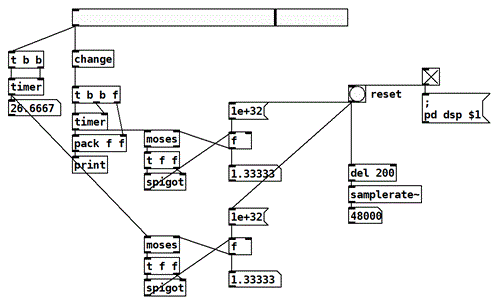-
-
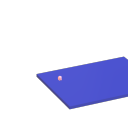 lacuna
posted in technical issues • read more
lacuna
posted in technical issues • read moreinlet~ helpfile

Connect [f $1] to [inlet~].
Or use [sig~ $1] ? Not sure what you want to do? -
 lacuna
posted in technical issues • read more
lacuna
posted in technical issues • read more
Try to undestand the patch and read the manual, esp. 2 control.examples / 08.depthfirst.pd -
 lacuna
posted in technical issues • read more
lacuna
posted in technical issues • read moreVanilla's Changelog (don't know if this is complete):
https://msp.ucsd.edu/Pd_documentation/resources/chapter5.htmYou probably used Pd-Extended 15 years ago!?
Extended is discontinued, but you can add libraries to Vanilla.
There is 'Deken' now: Pd-menu > help > find externals online .
There is also this website of Deken, which helps to find missing objects: deken.puredata.info
So [init] is part of IEMlib.
But is also easily replaceble as Vanilla abstraction:[loadbang]
|
[args 0(
|
[pdcontrol]
|
[list trim] [inlet]
|/
[outlet]pdcontrol did not exist 15 years ago.
All Vanilla objects: help > list of all objectsAnd there is the compatibility message to revert Vanilla to an old version:
[;pd compatibility 0.52(see message-helpfile > pd-messages
There have been many many improvements to Pd, intelligent patching for example.
And documentation also improved a lot!It has been a big shift when Pd went from 32 to 64 bit. In this transition some libraries have not been updated and I think it has been that time where Extended discontinued. You can still download it and run your old patches there ...
EDIT: more on finding externals or abstractions:
https://forum.pdpatchrepo.info/topic/15770/harmonic-amplification/4 -
 lacuna
posted in technical issues • read more
lacuna
posted in technical issues • read more@jamcultur I can reproduce this. Feels like a bug but I think it is the nature of abstractions saving confilicting with the array saving.
As workaround we can do our own array saving with [savestate]
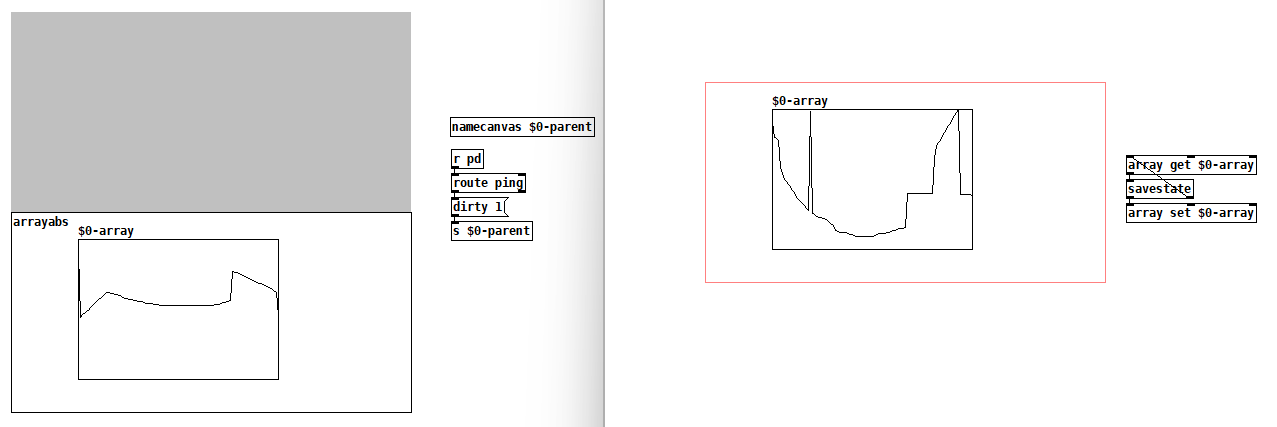
arrayabs.pd
arrayabsopenthis.pd -
 lacuna
posted in technical issues • read more
lacuna
posted in technical issues • read more@Balwyn said:
anything else opens the spigot
would be this:
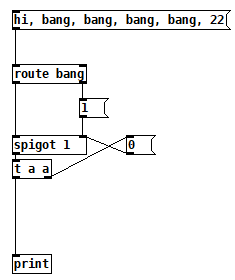
in your patch only floats open the spigot
-
 lacuna
posted in technical issues • read more
lacuna
posted in technical issues • read moreMaybe the answer is in this video of Millers classes at 1:04:00
https://msp.ucsd.edu/syllabi/206.20s/movies/5b.may1.mp4
sorting starts at 59:19:15
overview: https://msp.ucsd.edu/syllabi/206.20s/index.htm -
 lacuna
posted in technical issues • read more
lacuna
posted in technical issues • read more
A comma in a message means "now comes another message"
so [1, 2(
is the same as
[t b b]
| |
[2( [1(So you could separate your two messages to subpatch with a comma instead of writing ;subpatch again. (where the semicolon means "send to")
-
 lacuna
posted in technical issues • read more
lacuna
posted in technical issues • read more@jameslo And when filtering zero, there are different timings at different samplerates and dsp on/off also differs.
At 48kHz samplerate and dsp off, lowest is 4 ms but very very rarely goes as low as 2.66667 ms. -
 lacuna
posted in technical issues • read more
lacuna
posted in technical issues • read more@jameslo wtf I expected 64 samples. It can go down to zero:
slider-min-update-rate.pd
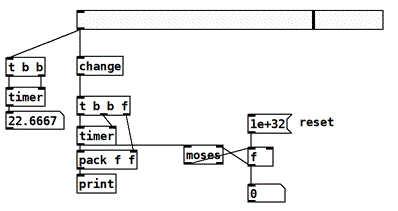
Is this related related? [Pd-list] pd-gui update rate (2011)
https://lists.iem.at/hyperkitty/list/pd-list@lists.iem.at/thread/NFL5EIGEJQII7G5X5FXGM2WXDM6W4263/#KJSQGTRBJVBZGMQPHFYRGYBQXN7GSOZL -
 lacuna
posted in technical issues • read more
lacuna
posted in technical issues • read morePress control+shift+escape to open the task manager, in details you can right click on wish86.exe and or pd.exe and define the allowed cores for the application.
I never tryed this but just saw it there now.
As @whale-av said, maybe you have to copy the pd folder and maybe rename the second application.
I guess there are other ways to start and run applications on a specific thread in win, but you can search for yourself as this is not Pd specific.And as @whale-av said, these instances are completly independent and they
won't run in sync. They run asynchronous. Useful for special tasks, for example to do sth with fast-forward-message while the other patch stays in real-time.If you want to spread patches across different cpu cores but still in sync, use the [pd~] object.
Either way shmem lib is very useful to share memory / share arrays between pd-instances.
(Looking at the task-manager when using [pd~] I see the cores are constanly changing, Looks like Windows is dynamicly changing the cores. Might be good enough or even better to let Windows manage it instead of assigning fixed threads. Same might be true when running asynchronous instances. )
-
-
-
 lacuna
posted in abstract~ • read more
lacuna
posted in abstract~ • read moreUpdated the patches:
Fixed 2 bugs:
Whole array size as default output.
Now also works if array-size changed.And cleaned up messy counter.
Added array-sort example to helpfile, changed thread title.
@ddw_music This was also my second try, giving up the first. And my thoughts where similar, especially if LUA would be handy here? I did not care too much about speed as I don't need this for realtime. Anyway an object written in C would be faster.
(This array-sort is much faster than [list-abs/list-sort], did not try [text]sort.)
Still I don't understand your idea of building a list without rescanning the array or list for each peak? But don't worry if you are done with it ... If I only had known how much time I spend with this .... -
 lacuna
posted in abstract~ • read more
lacuna
posted in abstract~ • read more@ddw_music Oh! Thank you! Yes, a minimal change in loading the 4th argument caused the bug! Moses! I might not have tested before uploading... blushing!!! Now I reuploaded it. Thank you
And this is quite slow... it is actually very slow. Wondering about a different approach. -
 lacuna
posted in abstract~ • read more
lacuna
posted in abstract~ • read moreVanilla abstraction, made with [array-max] and [array-min] by nulling found peak and run again.
array-maxx.pd
array-maxx-help.pd
array-minn.pd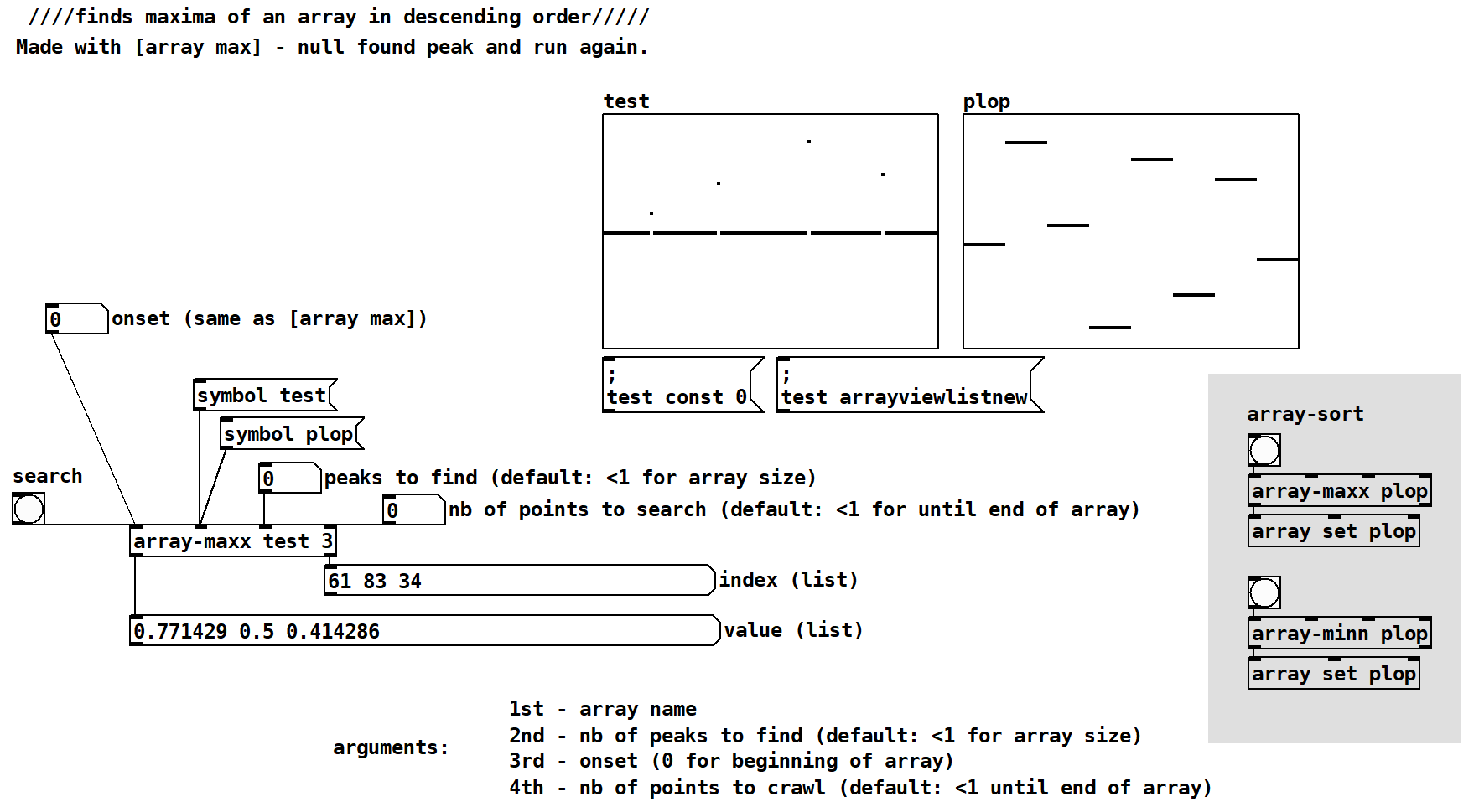
-
 lacuna
posted in technical issues • read more
lacuna
posted in technical issues • read more@porres read the first 3 or 5 posts of this thread and you will understand.
vsnapshot~ seems to return some arbitary? value.(And we are trying to restore the 'internal double precision state of phasor~' from the outside in single precision. It turned out that this thread is not about block-boundaries, sample-accuracy ect. )
-
 lacuna
posted in technical issues • read more
lacuna
posted in technical issues • read more@jameslo said:
count the number of blocks from when dsp gets turned on, and then run a fresh phasor in fast forward that same amount of time to get back to that state.
This might be the closest we can get.
The patch may not exeed the total running time (all fast-forwards added up) of 32 bit space .And ugly ....
(For DAW <> Pd I will open another thread some day when I am at it again. )
(forget ppphasor~ ...)
@porres vsnapshot~ is off
vsnapshot~isoff.pd
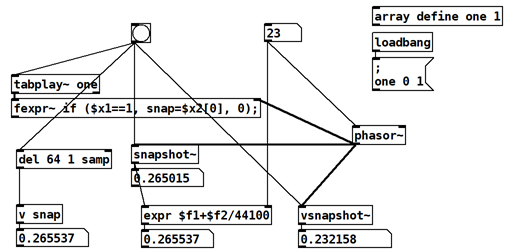
-
 lacuna
posted in technical issues • read more
lacuna
posted in technical issues • read moreThinking about [text sequence]... timing would not be double-accurate, so this might not work. Only rec/play the phaser as signal~ should work.
@FFW stop=frequency=0Hz State saving with cloned phasors~ running in parallel

